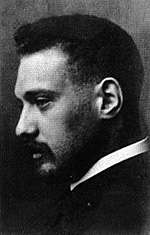David Ernst Oppenheim
David Ernst Oppenheim (20 April 1881 — 18 February 1943) was an Austrian educator and psychologist who collaborated with Sigmund Freud and Alfred Adler.

David Ernst Oppenheim was born in Brünn, Moravia, in Austria-Hungary, to a Jewish family, and educated at the University of Vienna where he studied philology and archaeology, graduating in 1904. He worked as a professor of Greek and Latin at a gymnasium in Vienna, and was interested in the ancient history and mythology.
Around 1909 he contacted Sigmund Freud, and in January 1910 was accepted as a member of the Vienna Psychoanalytic Association where he gave talks on the fire as a sexual symbol and on suicides at school age. Together with Freud, he wrote a manuscript entitled “Dreams in Folklore” in 1911 which was only published in 1958, because Oppenheim left the Association and instead joined the school of Individual Psychology of Alfred Adler in 1911. Oppenheim had an important position within the new school, and he wrote several articles in the Internationale Zeitschrift für Individualpsychologie.
Oppenheim took part in World War I at the Italian front but later became a pacifist and an active member in the Social Democratic Party of Austria.
In 1938, when Austria was annexed to the Third Reich, Oppenheim intended to emigrate to Australia where his daughters lived, but because of an illness he was not able take the trip. In 1942, he and his wife Amalie were transported to the concentration camp in Terezín where he died of diabetes in 1943. After World War II, his widow was able to move to Melbourne with a part of his archives.
Sources
- Mühlleitner, Elke (ed.). Biographisches Lexikon der Psychoanalyse: Die Mitglieder der Psychologischen Mittwoch-Gesellschaft und der Wiener Psychoanalytischen Vereinigung 1902–1938. pp. 239–240. ISBN 3-89295-557-3.
Bibliography
- Freud, Sigmund; Oppenheim, David Ernst (1958). Strachey, James (ed.). Dreams in Folklore (in English and German). Translated by A. M. O. Richards. New York: International Universities Press.
- Gaisbauer, Adolf, ed. (1996). „...von Eurem treuen Vater David“: David Ernst Oppenheim in seinen Briefen 1938–1942 (in German). Wien: Böhlau. ISBN 3-205-98417-X.
- Oppenheim, D. E. (1926). Dichtung und Menschenkenntnis: Psychologische Streifzüge durch alte und neue Literatur (in German). München: Bergmann.
- Singer, Peter (2003). Pushing Time Away: My Grandfather and the Tragedy of Jewish Vienna. Pymble (N.S.W): Fourth Estate. ISBN 0-7322-7742-6.
External links
- Oppenheim, David Ernst in Neue Deutsche Biographie.
- Träume im Folklore by Sigm. Freud & D. E. Oppenheim (in German).